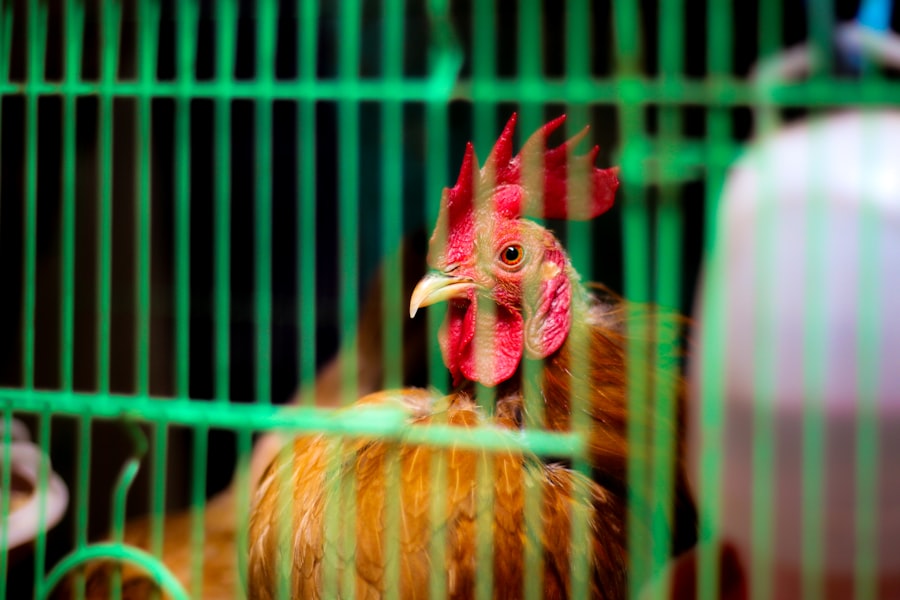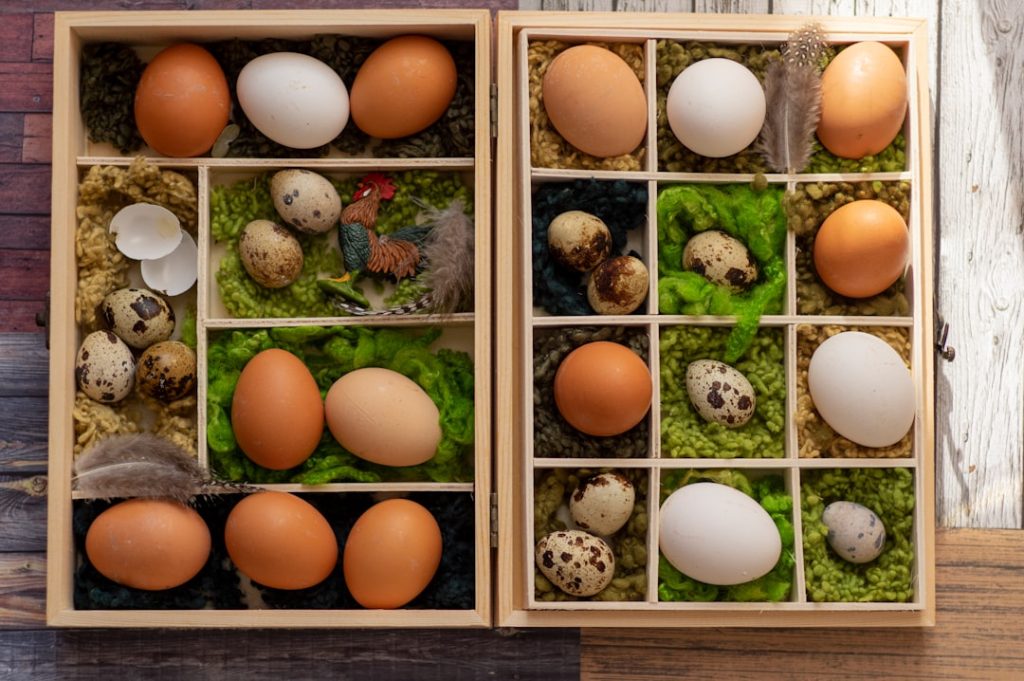When selecting chicken breeds for a backyard flock, several factors should be considered. Climate is a crucial consideration, as some breeds are better adapted to cold weather, while others thrive in warmer conditions. The purpose of the flock is also important, whether it’s for egg production, meat production, or companionship.
Popular egg-laying breeds include Rhode Island Red, Leghorn, and Australorp. Dual-purpose breeds like Plymouth Rock and Orpington are suitable for both egg and meat production. For meat production, Cornish Cross and Freedom Ranger are known for rapid growth and high meat yield.
Breeds such as Silkie and Orpington are renowned for their gentle nature, making them ideal for families with children. Available space is another critical factor. Some breeds are better suited to confinement and smaller spaces, while others require more room to roam.
Bantam breeds like Serama and Dutch bantam are suitable for smaller yards, whereas larger breeds such as Jersey Giant and Brahma need more space. Some breeds are better adapted to free-ranging, while others do well in confined runs. The choice of breed should ultimately be based on specific needs, preferences, available space, and local climate conditions.
Selecting a breed that is well-suited to the backyard environment will contribute to the health and productivity of the flock.
Table of Contents
- 1 Building a Coop and Run
- 2 Feeding and Watering
- 3 Health and Wellness
- 4 Egg Handling and Collection
- 5 Predator Protection
- 6 City Regulations and Permits
- 7 FAQs
- 7.1 What are the benefits of keeping chickens in your backyard?
- 7.2 What do chickens need to thrive in a backyard setting?
- 7.3 How much space do chickens need in a backyard setting?
- 7.4 What are some common challenges of keeping chickens in a backyard?
- 7.5 Are there any local regulations or restrictions for keeping chickens in a backyard?
- 7.6 What are some tips for keeping chickens healthy in a backyard setting?
Key Takeaways
- Consider the climate, space, and purpose of raising chickens when choosing the right breed
- Build a secure and spacious coop and run to provide shelter and protection for the chickens
- Provide a balanced diet and clean water for the chickens to ensure their health and well-being
- Regularly monitor the chickens for signs of illness and implement preventive measures for common health issues
- Collect eggs daily and store them properly to maintain freshness and quality
- Install predator-proof fencing and secure latches to protect the chickens from potential threats
- Check local regulations and obtain necessary permits before keeping chickens in a city or urban area
Building a Coop and Run
Predator-Proofing and Ventilation
When building a coop for your backyard chickens, there are several important factors to consider. First and foremost, you’ll want to make sure that the coop is predator-proof. This means using sturdy materials like hardware cloth and heavy-duty locks to keep out predators like raccoons, foxes, and hawks. Additionally, you’ll want to make sure that the coop is well-ventilated to prevent moisture buildup and respiratory issues in your chickens. Good ventilation can be achieved through windows, vents, and proper placement of the coop.
Designing a Comfortable Run
When it comes to building a run for your chickens, there are a few key considerations to keep in mind. First, you’ll want to make sure that the run is large enough to accommodate your flock comfortably. A good rule of thumb is to provide at least 10 square feet of space per chicken in the run. Additionally, you’ll want to make sure that the run is secure and predator-proof, with a sturdy roof to protect against aerial predators like hawks.
Providing Enrichment and Maintenance
It’s also important to provide plenty of enrichment in the run, such as perches, dust baths, and toys to keep your chickens entertained and active. Finally, you’ll want to make sure that the run is well-drained to prevent mud buildup and potential health issues for your flock. By taking these factors into consideration when building your coop and run, you can create a safe and comfortable living environment for your backyard chickens.
Feeding and Watering
Proper feeding and watering are essential for keeping your backyard chickens healthy and happy. When it comes to feeding, it’s important to provide a balanced diet that meets all of your chickens’ nutritional needs. This typically includes a commercial layer feed that is specifically formulated for laying hens.
Additionally, you can supplement their diet with treats like fruits, vegetables, mealworms, and kitchen scraps. It’s important to provide access to fresh water at all times, as dehydration can quickly become a serious issue for chickens. In addition to providing fresh water for drinking, it’s also important to provide a dust bath for your chickens to help them maintain healthy feathers and skin.
When it comes to feeding and watering your backyard flock, there are several important factors to keep in mind. First and foremost, it’s important to provide access to fresh water at all times. Dehydration can quickly become a serious issue for chickens, so it’s essential to regularly check and refill their waterers.
Additionally, it’s important to provide a balanced diet that meets all of your chickens’ nutritional needs. This typically includes a commercial layer feed that is specifically formulated for laying hens. You can also supplement their diet with treats like fruits, vegetables, mealworms, and kitchen scraps.
It’s important to monitor your chickens’ food intake and adjust their diet as needed based on their activity level and egg production. By providing a balanced diet and access to fresh water, you can help ensure that your backyard chickens stay healthy and happy.
Health and Wellness
Maintaining the health and wellness of your backyard chickens is essential for their overall well-being and productivity. Regular health checks are important for catching any potential issues early on and preventing the spread of disease within your flock. This includes checking for signs of illness or injury, monitoring their behavior and egg production, and keeping an eye out for any changes in their appearance or demeanor.
Additionally, it’s important to provide regular preventative care such as deworming and parasite control to keep your flock healthy. In addition to regular health checks, it’s important to provide a clean living environment for your chickens to prevent the spread of disease. This includes regularly cleaning their coop and run, providing clean bedding material, and ensuring good ventilation to prevent moisture buildup.
It’s also important to practice good biosecurity measures by limiting exposure to outside birds and animals, quarantining new birds before introducing them to your flock, and practicing good hygiene when handling your chickens. By taking these steps to maintain the health and wellness of your backyard flock, you can help ensure that they live long and healthy lives.
Egg Handling and Collection
Proper egg handling and collection are essential for ensuring the safety and quality of the eggs produced by your backyard flock. When it comes to collecting eggs, it’s important to do so regularly to prevent them from being damaged or soiled by other chickens. It’s also important to handle eggs gently to prevent cracking or breaking them.
Once collected, eggs should be stored in a cool place out of direct sunlight until they can be refrigerated. In addition to proper egg collection, it’s important to regularly clean and inspect the nesting boxes where your chickens lay their eggs. This helps prevent the spread of bacteria and disease within your flock and ensures that the eggs remain clean and safe for consumption.
It’s also important to regularly clean and sanitize any equipment used for egg collection and storage, such as egg baskets or cartons. By following these best practices for egg handling and collection, you can help ensure that the eggs produced by your backyard flock are safe and high quality.
Predator Protection

Building a Secure Coop and Run
First and foremost, it’s important to build a secure coop and run using sturdy materials like hardware cloth and heavy-duty locks. This helps prevent predators from gaining access to your chickens while they sleep or roam during the day.
Regularly Inspecting the Perimeter
In addition to building a secure coop and run, it’s important to regularly inspect the perimeter of your property for potential entry points where predators could gain access. This includes checking for gaps in fencing or areas where predators could dig under or climb over barriers.
Providing Additional Protection
It’s also important to provide additional protection during times when predators are most active, such as at night or during mating season when hawks may be more aggressive in hunting for food. By taking these steps to protect your backyard flock from predators, you can help ensure that they remain safe and secure in their living environment.
City Regulations and Permits
Before starting a backyard chicken flock in an urban or suburban area, it’s important to research local city regulations and obtain any necessary permits or approvals. Many cities have specific ordinances regarding keeping chickens within city limits, including restrictions on the number of chickens allowed per property, setback requirements for coops and runs, noise regulations, and waste management guidelines. In addition to researching local regulations, it’s also important to consider any potential concerns from neighbors or homeowner associations regarding keeping chickens on your property.
Open communication with neighbors about your plans for keeping chickens can help address any concerns they may have and prevent potential conflicts down the road. By taking the time to research local regulations and obtain any necessary permits or approvals before starting a backyard chicken flock, you can help ensure that you are in compliance with city ordinances and set yourself up for success in raising happy and healthy chickens in an urban or suburban environment. In conclusion, raising backyard chickens can be a rewarding experience that provides fresh eggs, natural pest control, and entertainment for the whole family.
By carefully considering the breed of chicken that best fits your needs and environment, building a secure coop and run, providing proper feeding and watering, maintaining the health and wellness of your flock, handling eggs properly, protecting against predators, and understanding city regulations and permits; you can create a successful backyard chicken flock that brings joy and benefits to your household while being a responsible member of your community.
If you’re interested in keeping chickens in your backyard, you may also want to consider caring for goslings. Poultry Wizard has a helpful article on how to care for goslings, which provides valuable information on raising and nurturing these adorable baby geese. Learning about the care of goslings can be a great addition to your backyard poultry knowledge.
FAQs
What are the benefits of keeping chickens in your backyard?
Keeping chickens in your backyard can provide you with a sustainable source of fresh eggs, natural pest control, and fertilizer for your garden. They also make great pets and can teach responsibility to children.
What do chickens need to thrive in a backyard setting?
Chickens need a secure coop for shelter, access to fresh water, a balanced diet of chicken feed and kitchen scraps, and a safe outdoor area for foraging and exercise. They also require protection from predators.
How much space do chickens need in a backyard setting?
Chickens need at least 2-3 square feet of coop space per bird and 8-10 square feet of outdoor space per bird. It’s important to provide enough space for them to move around comfortably and engage in natural behaviors.
What are some common challenges of keeping chickens in a backyard?
Common challenges of keeping chickens in a backyard include predator attacks, disease prevention, and managing waste. It’s important to research and prepare for these challenges before getting chickens.
Are there any local regulations or restrictions for keeping chickens in a backyard?
Many cities and towns have regulations regarding the keeping of chickens, including limits on the number of birds allowed, coop requirements, and distance from neighboring properties. It’s important to check local ordinances before getting chickens.
What are some tips for keeping chickens healthy in a backyard setting?
To keep chickens healthy, provide them with a balanced diet, clean water, regular access to fresh air and sunlight, and regular health check-ups. It’s also important to practice good hygiene and cleanliness in the coop.
Meet Walter, the feathered-friend fanatic of Florida! Nestled in the sunshine state, Walter struts through life with his feathered companions, clucking his way to happiness. With a coop that’s fancier than a five-star hotel, he’s the Don Juan of the chicken world. When he’s not teaching his hens to do the cha-cha, you’ll find him in a heated debate with his prized rooster, Sir Clucks-a-Lot. Walter’s poultry passion is no yolk; he’s the sunny-side-up guy you never knew you needed in your flock of friends!







